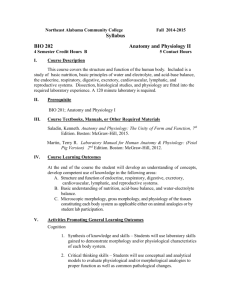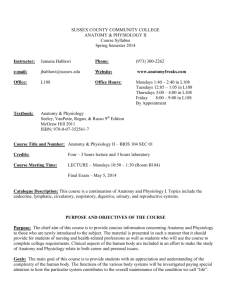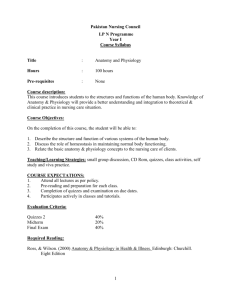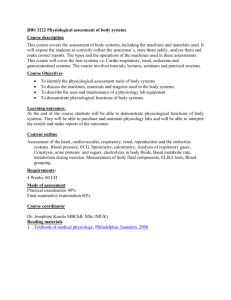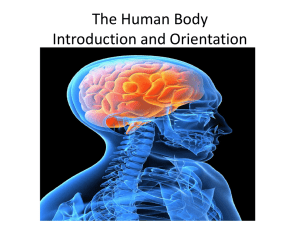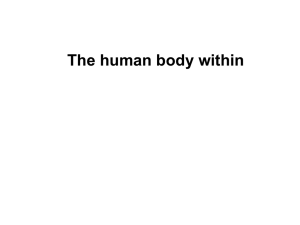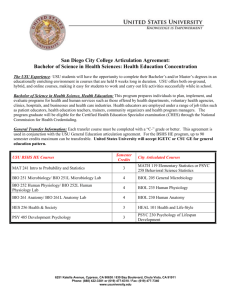BIO 212 - Chesapeake College
advertisement
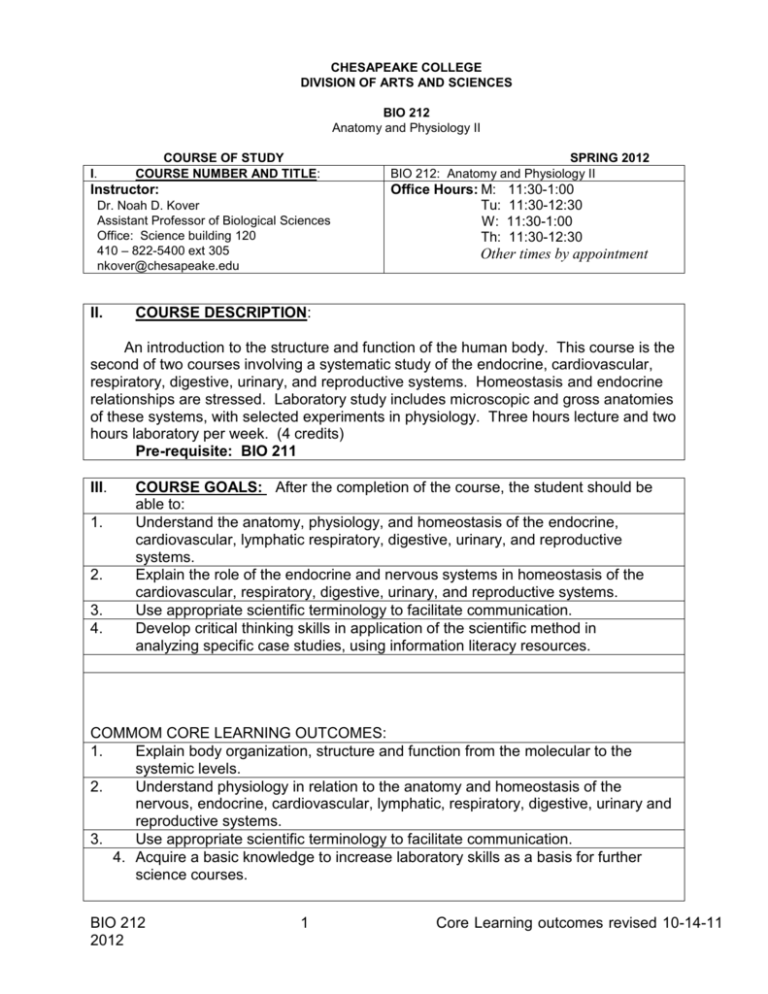
CHESAPEAKE COLLEGE DIVISION OF ARTS AND SCIENCES BIO 212 Anatomy and Physiology II I. COURSE OF STUDY COURSE NUMBER AND TITLE: Instructor: Dr. Noah D. Kover Assistant Professor of Biological Sciences Office: Science building 120 410 – 822-5400 ext 305 nkover@chesapeake.edu II. SPRING 2012 BIO 212: Anatomy and Physiology II Office Hours: M: Tu: W: Th: 11:30-1:00 11:30-12:30 11:30-1:00 11:30-12:30 Other times by appointment COURSE DESCRIPTION: An introduction to the structure and function of the human body. This course is the second of two courses involving a systematic study of the endocrine, cardiovascular, respiratory, digestive, urinary, and reproductive systems. Homeostasis and endocrine relationships are stressed. Laboratory study includes microscopic and gross anatomies of these systems, with selected experiments in physiology. Three hours lecture and two hours laboratory per week. (4 credits) Pre-requisite: BIO 211 III. 1. 2. 3. 4. COURSE GOALS: After the completion of the course, the student should be able to: Understand the anatomy, physiology, and homeostasis of the endocrine, cardiovascular, lymphatic respiratory, digestive, urinary, and reproductive systems. Explain the role of the endocrine and nervous systems in homeostasis of the cardiovascular, respiratory, digestive, urinary, and reproductive systems. Use appropriate scientific terminology to facilitate communication. Develop critical thinking skills in application of the scientific method in analyzing specific case studies, using information literacy resources. COMMOM CORE LEARNING OUTCOMES: 1. Explain body organization, structure and function from the molecular to the systemic levels. 2. Understand physiology in relation to the anatomy and homeostasis of the nervous, endocrine, cardiovascular, lymphatic, respiratory, digestive, urinary and reproductive systems. 3. Use appropriate scientific terminology to facilitate communication. 4. Acquire a basic knowledge to increase laboratory skills as a basis for further science courses. BIO 212 2012 1 Core Learning outcomes revised 10-14-11 IV. COURSE REQUIREMENTS: Specific behavioral objectives are found in three sources: in the text, in the laboratory manual, and with each unit of the syllabus. To complete the requirements of the course, the student must master course objectives by; 1. Complete Learning Outcomes as reflected in specific chapter objectives. 2. Complete all theory quizzes and examinations, with a minimum grade of 75. 3. Complete all laboratory quizzes and examinations, with a minimum grade of 75. 4. Complete all laboratory, computer, and L.R.C. assignments on time. 5. Apply the scientific method in solving specific case studies, using information literacy resources. 6. Complete any standardized tests given at the end of the course, if any. BIO 212 2012 2 Core Learning outcomes revised 10-14-11 V. COURSE OUTLINE: DATE: Week # 1: DISCUSSION TOPIC: Endocrine TEXT PAGES: Chapter 16 Week #2: Endocrine: continued Chap.16 Week #3: Hematology Chap. 17 Exam 1 Chap. 17 Week #5: Circulation, lymphatics Chap. 19-20 Week #6: Blood and Heart. Cardiovascular, lymphatics cont. Chap. 19-21 Week #7: Respiratory System Chap. 22 Week #8: Exam #2: Chap. 22 continued… Week #9: Mid-term grades due Digestive System Chap. 23-24. Week #10: Digestive System Chap. 23-24, review Chap. 21 Week #4: Chap. 25 Week #11: Exam #3: Select Topics Chaps. 25-26 Chap. 22-25 Week #12: BIO 212 2012 Urinary System Continued… 3 Chap. 25-26. Core Learning outcomes revised 10-14-11 Week #13: Urinary System Chapter 25 Week #14: Reproductive System Ch. 27-28 Examination Week: In class final examination: Times vary - CUMULATIVE (*As the schedule allows, tests may be rescheduled to meet learning needs of the entire class.) Laboratory Schedule Overview DATE: Week # 1: Week # 2: Week # 3: Week # 4: Week # 5: Week # 6: Week # 7: Week # 8: Week # 9: Week # 10: Week. # 11: Week # 12: Week # 13: LABORATORY TOPIC: Introduction to the Laboratory Laboratory # 1: Special Senses: Eyeball dissection Laboratory #2: endocrine Laboratory #3: Hematology Blood *Select Topics Laboratory #4: Laboratory #5: Circulation and lymphatics Laboratory #6: Circulation and lymphatics LAB TEXT PAGES: For new/all students. Ex. 23-26 Ex. 23-26 Ex. 29A, 30, PhysioEx #29B Lab test 1 Ex. 30-31 Dissection Demo- Sheep Heart Ex. 32-33A, Dissection- Cat #4-5 Ex. 33A, 35A Laboratory #7: Respiratory Laboratory #8: Respiratory System - spirometry Laboratory #10: Digestive Lab test 2 Ex. 40, Dissection - Kidney Lab Test 3 Laboratory#12: Urinary system Laboratory#13 Reproductive System Ex. 27, 42-43 Lab Test 4 Week # 14: (*As the schedule allows, lab content may vary to meet learning needs of the entire class.) BIO 212 2012 4 Core Learning outcomes revised 10-14-11 VI: TEACHING METHODS: Lecture, discussion, cooperative learning, use of models, charts and diagrams, audiovisual aids (overhead transparencies, 16 mm. films, videotapes, CDs, interactive computer simulations, software), interactive media, microscopy, use of laboratory specimen (fresh, frozen, preserved), reading assignments; instructor prepared handouts, selected laboratory experimentation, special multimedia assignments, Internet applications. VII. REQUIRED INSTRUCTIONAL MATERIALS:: Theory Text: Marieb, E.N. . Human anatomy and physiology. current edition. California: The Benjamin/Cummings Publishing Company. (ISBN 0-8053-5909-5) Laboratory Text: Marieb, E.N. . Human anatomy and physiology laboratory manual. (Cat version) current edition. California: The Benjamin/Cummings Publishing Company (ISBN 0-8053-7362-4)) Dissection Kit and Dissection Apron (supplied) My A&P and The Anatomy & Physiology Place web links. ******Course ID Number ______________****** PhysioEx CD located in back of Laboratory manual VIII. METHODS OF EVALUATION: Evaluation will be based upon the following: The following grading scale will be used: A= 100-93 B= 92-84 C= 83-75 D= 74-65 F= 64 & Below 4 Lecture Exams and quizzes/assignments = 70% 4 Laboratory Tests, Participation and assignments = 30% IX. EXPECTATIONS: 1. Attend all lecture and laboratory classes. 2. Come to class & lab prepared. Read all assigned text chapters, & review laboratory exercises in advance. 3. Abide by the Student Code of Conduct (See Chesapeake College Catalog). No cheating, stealing, lying, or plagiarizing. 4. Participate actively in classroom discussions and projects, respect others, put forth good effort, use safe laboratory procedures, and clean up after yourself. 5. The weeks for examinations are found in the syllabus. Examination dates and updates will be announced in class. Exams consist of objective questions, matching questions, and short answer questions. Attendance at testing is mandatory. If a student must miss an examination, the student must notify the instructor PRIOR to the test (not during or after the test) to discuss the specifics of the situation. It is expected that the student will complete the test in the Testing Center prior to the next scheduled class. BIO 212 2012 5 Core Learning outcomes revised 10-14-11 Special Needs Students: Student with special needs or disabilities must present documentation to instructor and any required accommodations will be met. BIO 212: ANATOMY AND PHYSIOLOGY II GRADES TO DATE for:______________________ THEORY (Lecture): Exam #1 – Endocrine, Hematology Exam #2 – Circulation, Heart, Lymphatic, Respiratory, Exam 1 material Exam #3 – Digestive, Exam 1+2 Material Exam #4 – Urinary and Reproduction, Cumulative Theory Average* LABORATORY: Test #1 - Special Senses* Endocrine, Blood Test #2 - heart, Circulatory & Lymphatics, Respiratory Test #3 - Digestive, Test #4 – Urinary, Reproductive Systems Laboratory Average* Must average above 70% in lecture and lab portion of class to earn a grade of a C NOTE: Keep track of your grades & attendance. Attend Tutor Sessions…proved to increase AP grade. Don’t forget about Chesapeake’s Academic Support Services ***MaryLu Towey Additional Notes NO TAPE RECORDERS ALLOWED Continuous talking, disrespect to teacher or classmates, inappropriate behavior and cell phone disruptions will result in removal of the current lecture BIO 212 2012 6 Core Learning outcomes revised 10-14-11 ‘; SEPARATE HERE AND GIVE COPY TO YOUR INSTRUCTOR ------------------------------------------------------------------------------------------------------------------ Course Number & Section: ________BIO 212______________ Spring 2012 INSTRUCTOR'S NAME: Dr. Noah D. Kover This is to certify that I ______________________________________________ have received a copy of the course outline and that it has been explained to me. I have read the outline and have agreed to the evaluation criteria as stated. Signature: Date: ___________________________________________________ ________________________________ BIO 212 2012 7 Core Learning outcomes revised 10-14-11
